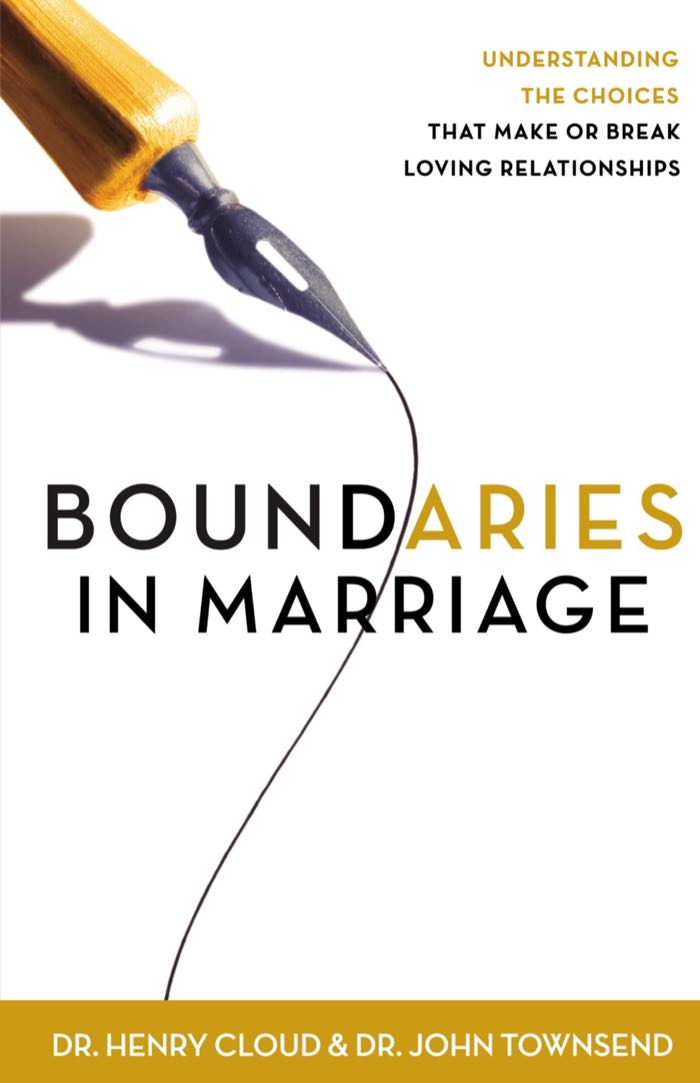Boundaries in Marriage
by Dr. Henry Cloud and Dr. John Townsend
Reviewed date: 2025 Feb 11
256 pages
Reviewed date: 2025 Feb 11
256 pages
Thumbs up on this one.
I found more to like about Boundaries in Marriage than I did about the original Boundaries book. There are better ways to understand interpersonal relationships than through boundaries, but Boundaries in Marriage gives practical examples of how boundaries can be used as a tool to spur personal growth in both the boundary-setting and the boundary-busting spouse. Plus—and this is a big one—Cloud and Townsend explain the ways boundaries can be misused and abused.
Boundaries are only built and established in the context of relationships. To run from a relationship as the first step of boundaries is not to have boundaries at all. It is a defense against developing boundaries with another person. The only place boundaries are real is within relationships.
Boundaries in Marriage is not the same as Boundaries on Your Spouse.
Ten Laws of Boundaries
- The Law of Sowing and Reaping - "Our actions have consequences." Don't bail out your spouse. The one who sows should reap the consequences. If one spouse allows the other to avoid responsibility for his or her poor behavior, this will cause long-term problems.
- The Law of Responsibility - "We are responsible to each other, but not for each other." Don't take ownership of your spouse's life. Do your part, but you can't be responsible for your spouse's actions or feelings.
- The Law of Power - "We have power over some things; we don't have power over others (including changing people)." You don't have the power to change your spouse. You only have power over your own actions--and even then, you are often dependent on the Holy Spirit for real internal change.
- The Law of Respect - "If we wish for others to respect our boundaries, we need to respect theirs."
- The Law of Motivation - "We must be free to say no before we can wholeheartedly say yes." Saying yes but grudgingly or out of fear is not a healthy long-term solution. Pay attention to your motivations when making a decision.
- The Law of Evaluation - "We need to evaluate the pain our boundaries cause others." Does that pain lead to injury or to growth? We can sometimes fail to set healthy boundaries because we mistake the pain they will cause for injury, when in reality the pain will bring growth and maturity.
- The Law of Proactivity - 'We take action to solve problems based on our values, wants, and needs." Be proactive to prevent bottled-up feelings from erupting in blowups.
- The Law of Envy - "We will never get what we want if we focus outside our boundaries onto what others have." If we focus on others instead of ourselves, we won't set boundaries because we're devaluing what we have (and the choices we have) and envying what others have.
- The Law of Activity - "We need to take the initiative in setting limits rather than be passive." Take initiative. Take risks. We cannot be passive if we want change.
- The Law of Exposure - "We need to communicate our boundaries to each other." A boundary that is secret or not communicated is neither a boundary or effective.
Values in marriage
- Love of God
- Love of Your Spouse
- Honesty
- Faithfulness
- Compassion and Forgiveness
- Holiness
